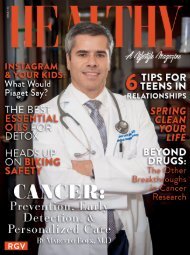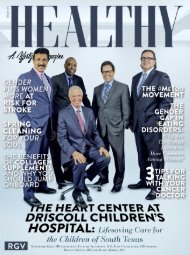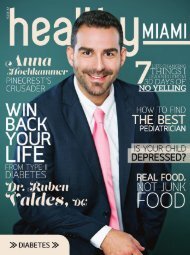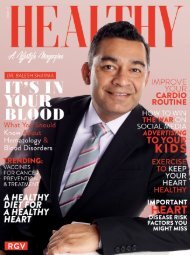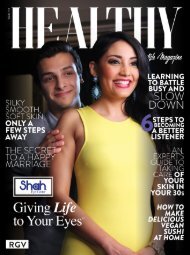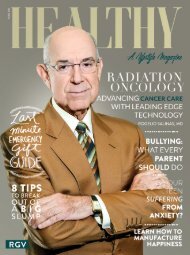Healthy RGV Issue 103 - What All Men Need to Know
You also want an ePaper? Increase the reach of your titles
YUMPU automatically turns print PDFs into web optimized ePapers that Google loves.
HEALTHY LIFESTYLE · JUNE 2017<br />
SIGNS AND SYMPTOMS OF<br />
ATRIAL FIBRILLATION<br />
It's a commonplace for people <strong>to</strong> say<br />
they’re experiencing heart palpitations<br />
or discuss being out of breath. They’re<br />
common phrases used in everyday<br />
conversation, but some people when<br />
they experience symp<strong>to</strong>ms like those, the<br />
experience can be incredibly jaw-dropping, if<br />
not extremely frightening.<br />
By definition,<br />
Atrial Fibrillation is<br />
defined as an irregular,<br />
often rapid heart rate that<br />
commonly causes poor blood<br />
flow and requires immediate<br />
medical attention when signs or<br />
symp<strong>to</strong>ms present themselves.<br />
The problem is, this condition<br />
may not have any outward<br />
symp<strong>to</strong>ms at all.<br />
However, when symp<strong>to</strong>ms do appear they<br />
can include anything from heart palpitations<br />
(feeling like your heart is beating <strong>to</strong>o hard<br />
or <strong>to</strong>o fast or might be skipping a beat or<br />
fluttering), shortness of breath, tightening in<br />
the chest, and/or fatigue. The more extreme<br />
pain is typically concentrated in the chest<br />
area, but can also include dizziness, an<br />
inability <strong>to</strong> exercise, a dull pallor (change in<br />
skin color), weakness, lightheadedness, and<br />
confusion.<br />
The most common or well-known symp<strong>to</strong>m<br />
of Atrial Fibrillation is a fluttering (quivering)<br />
heartbeat. This is due <strong>to</strong> a misfiring of<br />
electrical impulses in the atria (the <strong>to</strong>p<br />
chambers of the heart). When the heart<br />
quivers, that’s what’s commonly known as<br />
fibrillating. When those symp<strong>to</strong>ms occur,<br />
most often they are accompanied by other<br />
symp<strong>to</strong>ms. In any combination, the various<br />
symp<strong>to</strong>ms <strong>to</strong>gether can require urgent<br />
medical care.<br />
Atrial fibrillation may only happen<br />
occasionally with symp<strong>to</strong>ms that come<br />
and go, and ultimately, s<strong>to</strong>p on their own.<br />
Because they s<strong>to</strong>p on their own, people often<br />
choose <strong>to</strong> ignore the seriousness of the<br />
issue. That makes it even more dangerous.<br />
The prevalence of this condition has grown<br />
greatly over the last several decades.<br />
Approximately 11% of people over the age of<br />
eighty are affected by Atrial fibrillation. It is<br />
far more common in adults as they age.<br />
In additional <strong>to</strong> the risks presented by<br />
the aging population, the ability of the<br />
symp<strong>to</strong>ms <strong>to</strong> be masked makes it more<br />
difficult <strong>to</strong> diagnose and, in many cases,<br />
goes undiagnosed until they’ve had another<br />
health scare like strokes, heart failure,<br />
diabetes, hypertension, and blood clots.<br />
But despite the large percentage of older<br />
people who suffer from Atrial Fibrillation,<br />
teens and young adults can also suffer from<br />
symp<strong>to</strong>ms. As with older adults, it can be<br />
single experiences or isolated events or won’t<br />
be diagnosed until there have been repeated<br />
episodes or until they’ve been diagnosed<br />
with other conditions. Unlike older adults, it<br />
is very rare <strong>to</strong> be diagnosed during routine<br />
checkups or yearly physical exams. Younger<br />
patients are almost exclusively asymp<strong>to</strong>matic.<br />
If you’re experiencing<br />
any symp<strong>to</strong>ms, including<br />
chest pain, a feeling of<br />
a very rapid heart rate<br />
(greater than 100 beats<br />
per minute), or any of the<br />
above-mentioned signs<br />
and symp<strong>to</strong>ms, speak <strong>to</strong><br />
your doc<strong>to</strong>r.<br />
The only way <strong>to</strong> confirm whether what you’re<br />
experiencing is actual Atrial Fibrillation, is <strong>to</strong><br />
visit your doc<strong>to</strong>r as it can only be diagnosed<br />
via an electrocardiogram or other diagnostic<br />
cardiac rythm moni<strong>to</strong>ring tests.<br />
By Joaquin N Diego,<br />
MD, FCCP, FACC<br />
18 HEALTHY MAGAZINE



